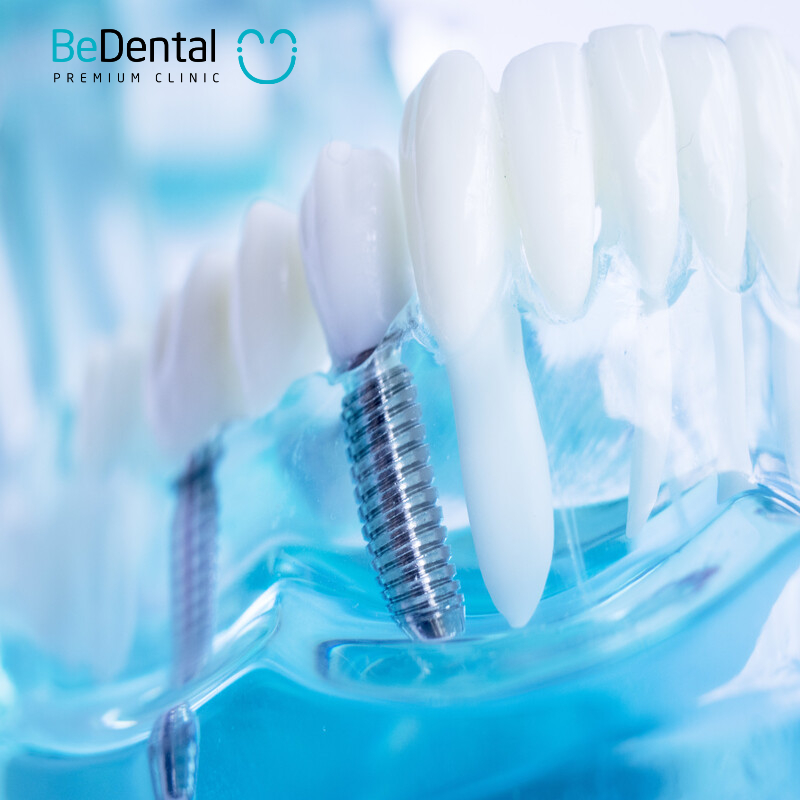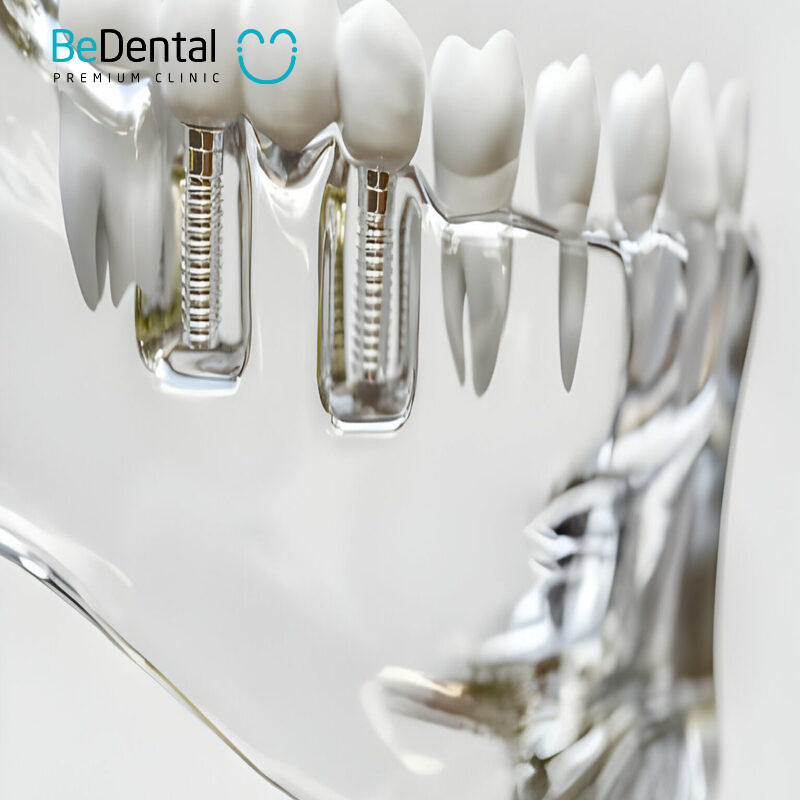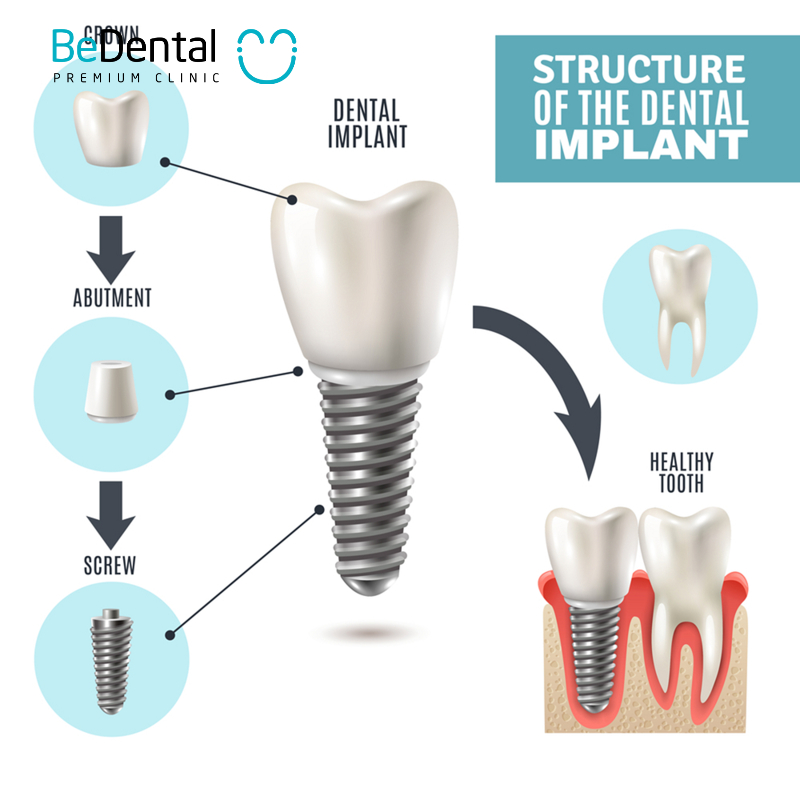Dental implant surgery is a modern and effective solution for replacing missing teeth, boasting a success rate of up to 98% after 10 years. However, proper oral care following the procedure is crucial for ensuring durability and maintaining oral health. Let’s explore How to care for your teeth after dental implant.
The Importance of Post-Implant Oral Care
Taking care of your teeth after dental implant surgery is vital for ensuring the success of the procedure and maintaining long-term oral health. Here are some reasons why this care is essential:
- Ensuring Bone Integration: After implant placement, the implant needs time to integrate with the jawbone. Proper oral hygiene reduces the risk of infection, which facilitates the implant’s secure attachment to the bone.
- Preventing Complications: Careful oral hygiene helps prevent complications such as gum inflammation, infections, or damage around the implant. These issues can adversely affect oral health and potentially lead to implant loss.

- Maintaining Aesthetic Appeal: Daily oral hygiene preserves the shine and beauty of the crown attached to the implant. Without proper care, the prosthetic teeth may become discolored and lose their aesthetic appeal.
- Enhancing Overall Health: A healthy mouth positively impacts overall well-being. Maintaining oral hygiene helps prevent gum problems and bacterial infections, reducing the risk of other health issues.
- Ensuring Comfort and Functionality: Proper oral care helps you feel more comfortable while eating and speaking. This improvement enhances your quality of life and boosts your confidence in daily interactions.
How to care for your teeth after dental implant surgery
Implant surgery (Dental implants: What you need to know) is generally safe and does not lead to many complications. However, to ensure the effectiveness of the implant procedure and protect your oral health, it’s essential to pay attention to the following:
Pain and Swelling Management
After implant placement, controlling pain and swelling is crucial for a smooth recovery. Patients should take pain relief medications and antibiotics as prescribed by their dentist to minimize discomfort and prevent infection. Additionally, applying ice to the area near the implant for 15-20 minutes at a time can effectively reduce swelling.
Initial Oral Hygiene
In the first few days after surgery, patients need to be cautious about oral hygiene (From National institute of Dental and Craniofacial research) to avoid damaging the implant site. Avoid brushing directly on the implant area to prevent irritation; instead, use a soft-bristle toothbrush and carefully avoid that region. Rinsing with warm salt water or an antibacterial solution can effectively clean the mouth without harming the implant area.
Post-Surgery Diet
Diet plays a crucial role in the recovery process. For the first 48 hours, patients should prioritize soft, cool foods to avoid irritating the implant area. Ideal options include porridge, soup, or smoothies. Additionally, it’s important to stay away from hot, spicy, or hard foods, as they can increase pain and discomfort at the implant site.

Long-Term Implant Care
To maintain the health of your dental implant over the long term, it’s essential to consider suitable dental hygiene tools. How to care for your teeth after dental implant with tools
Brushing and Flossing
Proper brushing is vital for maintaining oral health after dental implants. Patients should use a soft-bristle toothbrush and non-abrasive toothpaste to avoid damaging the implant area and surrounding gum tissue. Additionally, using dental floss is necessary to clean between teeth and around the implant post, helping to remove plaque and food particles that the toothbrush may miss.
Special Cleaning Tools
To ensure optimal oral hygiene, patients may consider using special cleaning tools. Interdental brushes or water flossers are helpful for cleaning hard-to-reach areas, effectively removing plaque and food debris that regular toothbrushes cannot clean. Furthermore, rinsing with an antibacterial mouthwash is an effective measure to prevent infections and protect oral health, especially after implant surgery.
Recognizing Potential Issues
After surgery, it’s important to closely monitor for any unusual signs and take prompt action as necessary.
Signs of Infection or Implant Failure
Monitoring the condition of the implant site is critical for early detection of any issues that may arise. Signs of infection or implant failure typically include swelling, persistent pain, or redness around the implant. Additionally, patients may experience discomfort or sensitivity while chewing and may notice unpleasant odors coming from the implant site. If any of these symptoms occur, it is important to quickly identify the cause to take appropriate action.

When to Contact Your Dentist
If patients notice any unusual signs, it is essential to contact their dentist. Promptly addressing any emerging issues not only helps ensure effective treatment but also prevents serious complications such as widespread infection or implant loss. The dentist will perform necessary examinations and provide appropriate treatment options to protect oral health and ensure the success of the implant procedure.
Why is BeDental a trusted name for implants in Vietnam?
BeDental is a trusted name for dental implants in Vietnam due to its skilled specialists, use of high-quality materials, and modern technology. The clinic offers personalized implant solutions with a focus on long-term success and patient comfort, making it a top choice for reliable dental care.
Proper oral care after dental implant surgery in Vietnam not only enhances the longevity of the implant but also safeguards your overall health. Implementing appropriate hygiene measures, managing pain, and maintaining a suitable diet are essential to prevent complications and ensure the implant functions effectively for many years. Don’t forget to monitor for any unusual signs and reach out to your dentist as needed. With the right care, you can confidently showcase your radiant smile and enjoy a fuller life.
For those seeking further consultation regarding dental examination services, please visit BeDental’s locations in Hanoi or Ho Chi Minh City. You can also reach us at our hotline: (+84) 934.61.9090 / (+84) 899.555.636 or through our Facebook page, BeDental, for prompt and accurate assistance.




